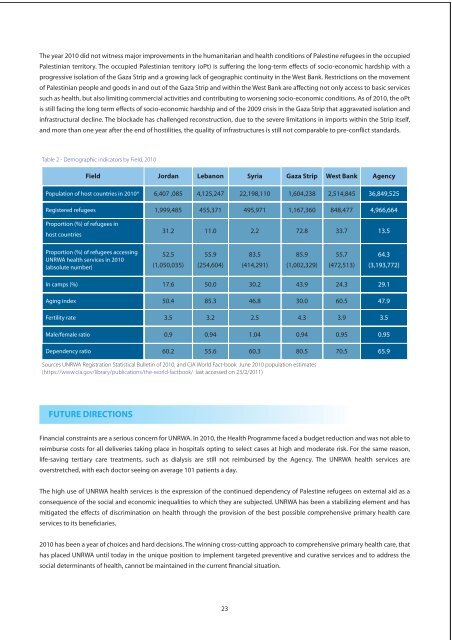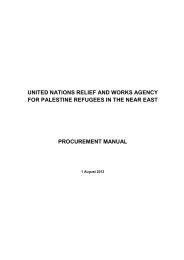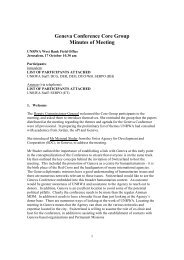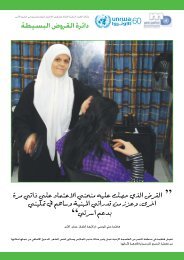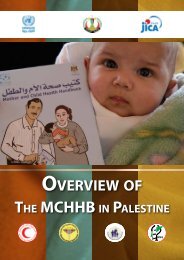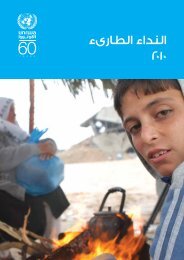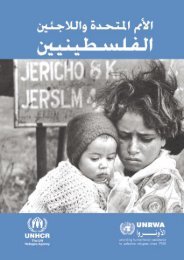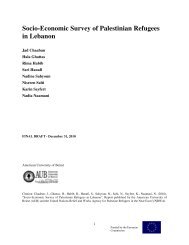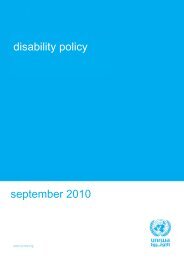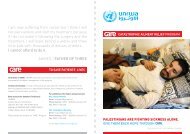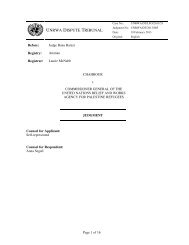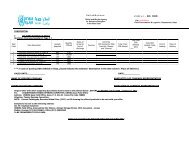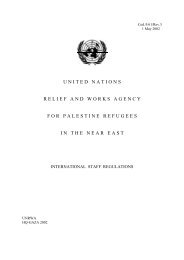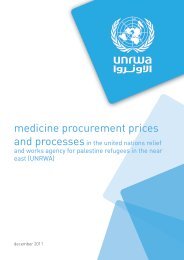Annual Report of the Department of Health 2010 - Unrwa
Annual Report of the Department of Health 2010 - Unrwa
Annual Report of the Department of Health 2010 - Unrwa
You also want an ePaper? Increase the reach of your titles
YUMPU automatically turns print PDFs into web optimized ePapers that Google loves.
The year <strong>2010</strong> did not witness major improvements in <strong>the</strong> humanitarian and health conditions <strong>of</strong> Palestine refugees in <strong>the</strong> occupied<br />
Palestinian territory. The occupied Palestinian territory (oPt) is suffering <strong>the</strong> long-term effects <strong>of</strong> socio-economic hardship with a<br />
progressive isolation <strong>of</strong> <strong>the</strong> Gaza Strip and a growing lack <strong>of</strong> geographic continuity in <strong>the</strong> West Bank. Restrictions on <strong>the</strong> movement<br />
<strong>of</strong> Palestinian people and goods in and out <strong>of</strong> <strong>the</strong> Gaza Strip and within <strong>the</strong> West Bank are affecting not only access to basic services<br />
such as health, but also limiting commercial activities and contributing to worsening socio-economic conditions. As <strong>of</strong> <strong>2010</strong>, <strong>the</strong> oPt<br />
is still facing <strong>the</strong> long term effects <strong>of</strong> socio-economic hardship and <strong>of</strong> <strong>the</strong> 2009 crisis in <strong>the</strong> Gaza Strip that aggravated isolation and<br />
infrastructural decline. The blockade has challenged reconstruction, due to <strong>the</strong> severe limitations in imports within <strong>the</strong> Strip itself,<br />
and more than one year after <strong>the</strong> end <strong>of</strong> hostilities, <strong>the</strong> quality <strong>of</strong> infrastructures is still not comparable to pre-conflict standards.<br />
Table 2 - Demographic indicators by Field, <strong>2010</strong><br />
Field<br />
Jordan Lebanon Syria Gaza Strip West Bank Agency<br />
Population <strong>of</strong> host countries in <strong>2010</strong>*<br />
6,407 ,085<br />
4,125,247<br />
22,198,110<br />
1,604,238<br />
2,514,845<br />
36,849,525<br />
Registered refugees<br />
1,999,485<br />
455,371<br />
495,971<br />
1,167,360<br />
848,477<br />
4,966,664<br />
Proportion (%) <strong>of</strong> refugees in<br />
host countries<br />
31.2<br />
11.0<br />
2.2<br />
72.8<br />
33.7<br />
13.5<br />
Proportion (%) <strong>of</strong> refugees accessing<br />
UNRWA health services in <strong>2010</strong><br />
(absolute number)<br />
52.5<br />
(1,050,035)<br />
55.9<br />
(254,604)<br />
83.5<br />
(414,291)<br />
85.9<br />
(1,002,329)<br />
55.7<br />
(472,513)<br />
64.3<br />
(3,193,772)<br />
In camps (%)<br />
17.6<br />
50.0<br />
30.2<br />
43.9<br />
24.3<br />
29.1<br />
Aging index<br />
50.4<br />
85.3<br />
46.8<br />
30.0<br />
60.5<br />
47.9<br />
Fertility rate<br />
3.5<br />
3.2<br />
2.5<br />
4.3<br />
3.9<br />
3.5<br />
Male/female ratio<br />
0.9<br />
0.94<br />
1.04<br />
0.94<br />
0.95<br />
0.95<br />
Dependency ratio<br />
60.2<br />
55.6<br />
60.3<br />
80.5<br />
70.5<br />
65.9<br />
Sources UNRWA Registration Statistical Bulletin <strong>of</strong> <strong>2010</strong>, and CIA World Fact-book June <strong>2010</strong> population estimates<br />
(https://www.cia.gov/library/publications/<strong>the</strong>-world-factbook/ last accessed on 23/2/2011)<br />
FUTURE DIRECTIONS<br />
Financial constraints are a serious concern for UNRWA. In <strong>2010</strong>, <strong>the</strong> <strong>Health</strong> Programme faced a budget reduction and was not able to<br />
reimburse costs for all deliveries taking place in hospitals opting to select cases at high and moderate risk. For <strong>the</strong> same reason,<br />
life-saving tertiary care treatments, such as dialysis are still not reimbursed by <strong>the</strong> Agency. The UNRWA health services are<br />
overstretched, with each doctor seeing on average 101 patients a day.<br />
The high use <strong>of</strong> UNRWA health services is <strong>the</strong> expression <strong>of</strong> <strong>the</strong> continued dependency <strong>of</strong> Palestine refugees on external aid as a<br />
consequence <strong>of</strong> <strong>the</strong> social and economic inequalities to which <strong>the</strong>y are subjected. UNRWA has been a stabilizing element and has<br />
mitigated <strong>the</strong> effects <strong>of</strong> discrimination on health through <strong>the</strong> provision <strong>of</strong> <strong>the</strong> best possible comprehensive primary health care<br />
services to its beneficiaries.<br />
<strong>2010</strong> has been a year <strong>of</strong> choices and hard decisions. The winning cross-cutting approach to comprehensive primary health care, that<br />
has placed UNRWA until today in <strong>the</strong> unique position to implement targeted preventive and curative services and to address <strong>the</strong><br />
social determinants <strong>of</strong> health, cannot be maintained in <strong>the</strong> current financial situation.<br />
23


